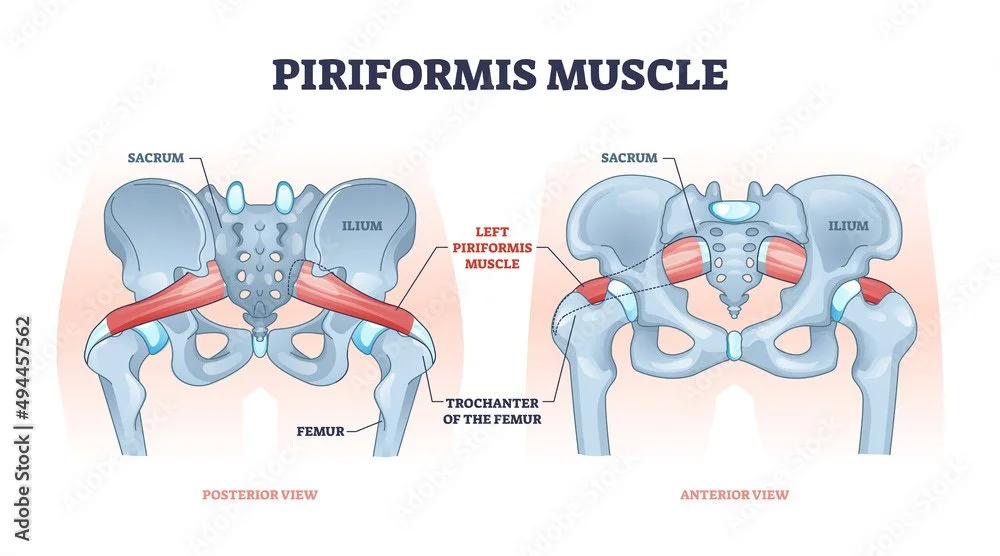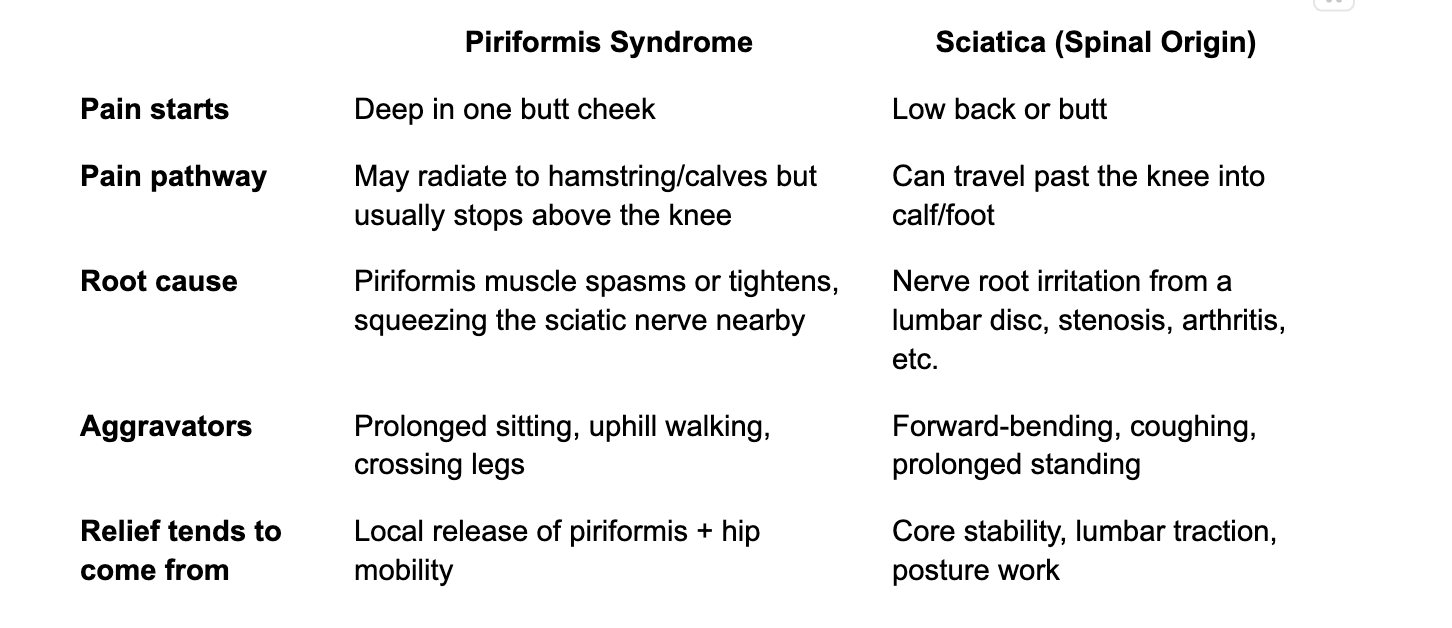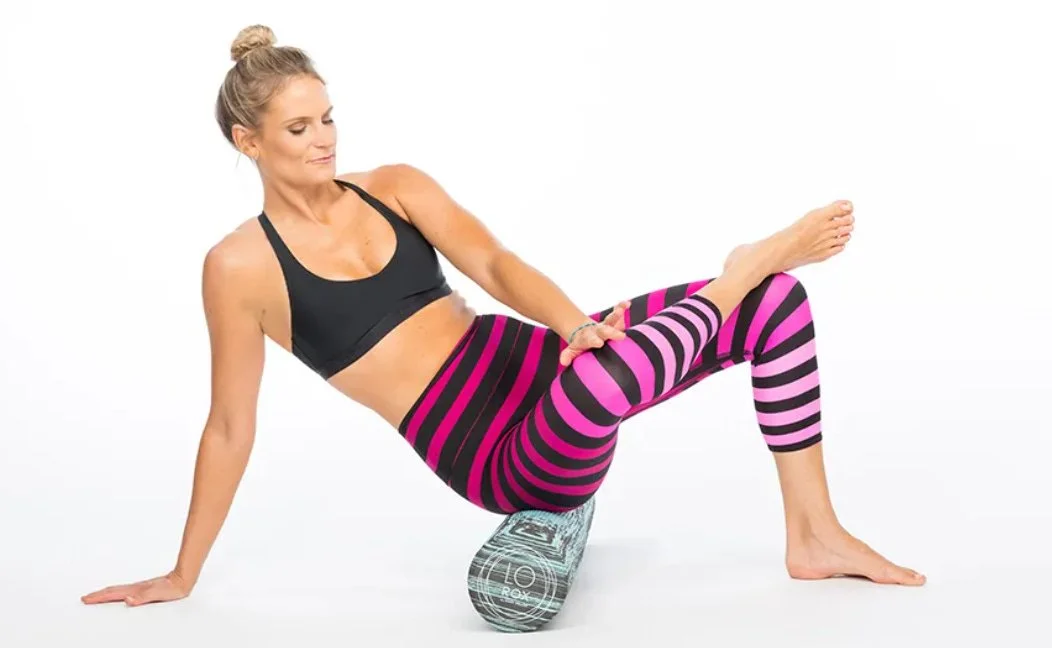Sciatica vs Piriformis Syndrome: Decode the Pain & Roll It Away
Untangling hip and leg pain—and the gentle foam-rolling fixes your body (and nervous system) will love!
Sciatica, Piriformis Syndrome…there is a lot of confusion about this topic. If sitting at your desk leaves a hot ache in your seat that sometimes zips down the back of your leg, you’ve probably been amongst the many who’ve Googled “HOT BUTT PAIN” at 2am and found that you have a scary, degenerative disc “disease” called Sciatica. But, the culprit isn’t always a cranky nerve root in your spine—sometimes—oftentimes— it’s a tight little hip rotator called the piriformis. Getting clear on which is which saves you from aimless stretches and opens the door to relief that actually sticks.
I’ve spent 15 years as a fascial-stretch therapist translating massage-table magic into DIY foam rolling techniques. Today I’m sharing what I teach clients when butt and leg pain blur together and exactly how to roll it out without sending your nervous system into fight-or-flight.
Tight Piriformis Muscle
Piriformis Syndrome vs. True Sciatica: The Quick-Glance Guide
When in doubt, ALWAYS seek a professional advice
Why Gentle Foam Rolling Works for Both
Self-Myofascial Release (SMR)
Rolling puts sustained, graded pressure into tight fascial tissue, signaling it to soften while boosting local blood flow. Research shows SMR can even dial down inflammatory chemicals around irritated nerves. (Bodyworkers know this in practice but there is so little scientific support for the things we witness on our tables)Neurological Down-Regulation
Slow, comfy pressure tells your brain “we’re safe,” nudging you out of cortisol-charged tension and into parasympathetic ease—vital when nerve pain has you clenched.Better Movement Patterns
Releasing sticky glutes and hamstrings frees your pelvis and lumbar spine to share load evenly, reducing future flare-ups.
When to Pause the Roller
Sudden, sharp leg weakness or numbness
Bowel/bladder changes
Pain unrelieved or worsened after a week of careful practice
These red flags warrant medical evaluation to rule out serious spinal causes.
Ready to Roll Deeper?
If this topic hit home, you’ll love my upcoming live foam rolling classes and free foam rolling challenge kicking off soon!
7-Day Foam Rolling Challenge (July 25-31): a week-long reset where each morning you’ll receive a therapist-crafted (me;) 5-7 minute video that targets a fresh tension hotspot, then pop into our private Instagram accountability chat to swap wins and stay consistent; this edition even drops an exclusive Day-5 Piriformis Release mini-session to ease sciatic-style pain. Every routine lands in your inbox to replay anytime, so if you’re ready to feel lighter, looser, and back in control of hip and leg discomfort, grab your roller and click below to save your spot!
Get access to our 7-day foam rolling challenge and Instagram accountability group! Starting July 25th, the lessons of this course will be emailed to you each day so, make sure to opt-in! Join the day's challenge and share your feedback in our chat group!
Summer Series (Aug 7–28): four weekly live foam rolling classes (Oakland studio or via Zoom) where we’ll map tension lines head-to-toe and practice smarter recovery together.
Because you don’t have to untangle nerve pain alone. I’m here, roller in hand, cheering you on every glide.
With ease, grace and love,
Maggie
P.S. Share this post with a friend who’s been calling all leg pain “sciatica.” Their piriformis might thank you.




